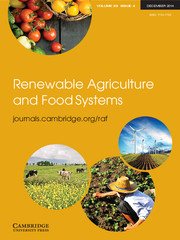Article contents
Analysis of fertilizer subsidy programs and ecosystem services in Malawi
Published online by Cambridge University Press: 13 January 2011
Abstract
This paper evaluates the delivery of ecosystem services under different regimes of agricultural input subsidy in post-independent Malawi using (1) the protocol of the Millennium Ecosystem Service to characterize the services; and (2) the panarchy framework to describe the relationships among the political regimes, economic growth [gross domestic product (GDP)] and food security. Ecosystem services are the benefits that humans obtain from ecosystems that support, directly or indirectly, human survival and quality of life. Panarchy is a nested set of adaptive cycles that provides a tool to explore the conductivity of ecological and social-cultural systems. The Malawian temporal political landscape has experienced several reorganizations since independence, in which the governments of Malawi have initiated socio-economic growth of the economy through implementation of different farmer input subsidy programs with variable success. The most recent agricultural subsidy program (2005–2009) appears to have shown an improvement in food security for the people of Malawi. However, this may be at the expense of an increased rate of decline in other ecosystem services, especially arable land resources and forestry. If agricultural subsidies continue to be implemented without a holistic understanding of all ecosystem services delivered to the whole country, then the system will be unsustainable. We recommend the ecosystem service approach and the panarchy framework as potentially useful tools for policy makers.
- Type
- Research Papers
- Information
- Copyright
- Copyright © Cambridge University Press 2011
References
- 11
- Cited by




